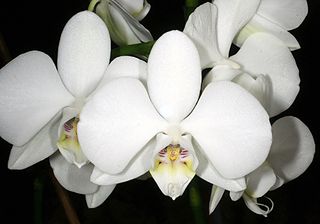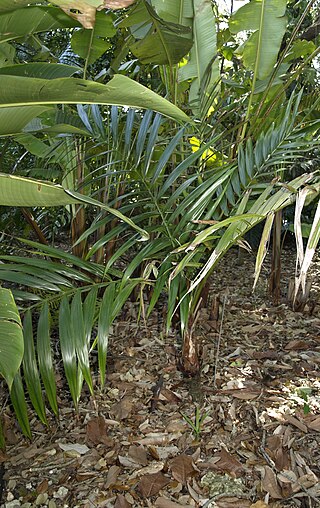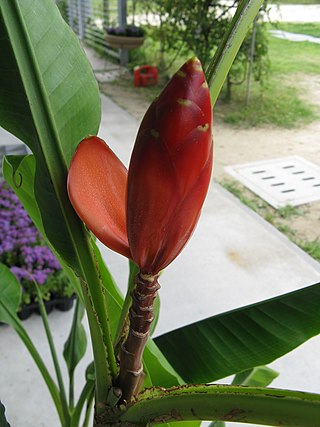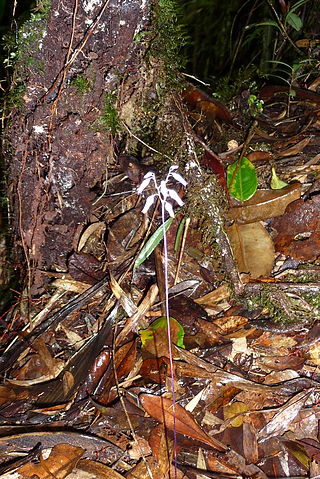Adenophaedra is a plant genus of the family Euphorbiaceae first described as a genus in 1874. It is native to tropical regions of South America and Central America.
- Adenophaedra cearensis Secco - Ceará
- Adenophaedra grandifolia (Klotzsch) Müll.Arg. - Costa Rica, Panama, Colombia, Venezuela, Guyana, French Guiana, Ecuador, Peru, NW Brazil
- Adenophaedra megaphylla (Mull.Arg.) Mull.Arg. - Colombia, Ecuador, Peru, Suriname, E Brazil

Olea capensis, the black ironwood, is an African tree species in the olive family Oleaceae. It is widespread in sub-Saharan Africa: from the east in Somalia, Ethiopia and Sudan, south to the tip of South Africa, and west to Cameroon, Sierra Leone and the islands of the Gulf of Guinea, as well as Madagascar and the Comoros. It occurs in bush, littoral scrub and evergreen forest.

Plinia is a genus of flowering plants in the myrtle family, Myrtaceae described by Linnaeus in 1753. It is native to Central and South America as well as the West Indies.

Olea europaea subsp. cuspidata is a subspecies of the well-known olive tree, which until recently was considered a separate species and is still mentioned as such in many sources. Native to northeast of Africa and the drier parts of subtropical Asia, it has various common names, including wild olive, African olive, brown olive and Indian olive.

Phalaenopsis amabilis, commonly known as the moon orchid, moth orchid, or mariposa orchid, is a species of flowering plant in the orchid family Orchidaceae. It is widely cultivated as a decorative houseplant. It is an epiphytic or lithophytic herb with long, thick roots, between two and eight thick, fleshy leaves with their bases hiding the stem and nearly flat, white, long-lasting flowers on a branching flowering stem with up to ten flowers on each branch.

Coccothrinax clarensis is a palm which is endemic to central and eastern Cuba. Its name suggests that it has small coconut-like fruit while clarensis comes from Santa Clara valley in Cuba where the species are found.

Rondeletia is a genus of flowering plants in the family Rubiaceae. It is endemic to the Neotropics. There are around 160 species.

Melaleuca lanceolata commonly known as black paperbark, moonah, Rottnest Island teatree and western black tea tree is a plant in the myrtle family, Myrtaceae and is native to Australia where it occurs in Western Australia, South Australia, Victoria, New South Wales and Queensland. It is a densely foliaged tree with rough bark, which flowers prolifically in summer.

Neonicholsonia is a monotypic genus of flowering plant in the palm family native to Central America. The sole species is Neonicholsonia watsonii. The genus and species names honor George Nicholson, a former curator of the Royal Botanic Gardens, Kew and his successor William Watson.

Oplismenus is a small genus of annual or perennial grasses, commonly known as basketgrass, found throughout the tropics, subtropics, and in some cases, temperate regions of the Americas, Africa, Asia, and Australia. The systematics of the genus are unclear, with over 100 described species, only 7 species are officially recognized as of 2016.

Microtis media, commonly known as the common mignonette orchid, is a species of herbaceous plants of the family Orchidaceae endemic to the south–west of Western Australia. It has a single tubular leaf and up to one hundred small, yellowish green flowers arranged along the flowering stem.

Barleria prionitis is a shrub in the family Acanthaceae, native to Island and Mainland Southeast Asia, China, the Indian Subcontinent, the Arabian Peninsula and northeastern Africa. It is widely spread as an ornamental and weed, occurring in naturalised populations around the world. It used not only as an ornamental but also as a hedge and extensively as a component of folk medicines. As a weed it is regarded as problematic in many areas.

Butia capitata, also known as jelly palm, is a Butia palm native to the states of Minas Gerais and Goiás in Brazil. It is known locally as coquinho-azedo or butiá in (northern) Minas Gerais. This palm grows up to 8m. It has feather palm pinnate leaves that arch inwards towards a thick stout trunk.

Allium senescens, commonly called aging chive, German garlic, or broadleaf chives, is a species of flowering plant in the genus Allium.

Eucomis pallidiflora, the giant pineapple lily, is a bulbous species of flowering plant in the family Asparagaceae, subfamily Scilloideae, native to southern Africa. The white to green flowers appear in summer and are arranged in a spike (raceme), topped by a "head" of green leaflike bracts. Some forms reach almost 2 m when in flower. The species is cultivated as an ornamental plant, although it is not hardy in areas where severe frosts occur.

Musa beccarii is a species of wild banana, found in Malaysia, in Sabah. It is placed in section Callimusa.

Dictyostega is a genus of flowering plants in the Burmanniaceae, first described as a genus in 1840. It contains only one known species, Dictyostega orobanchoides, native to southern Mexico, Central America, Trinidad, and South America ).

Tulipa sylvestris, the wild tulip or woodland tulip, is a Eurasian and North African species of wild tulip, a plant in the lily family. Its native range extends from Portugal and Morocco to western China, covering most of the Mediterranean and Black Sea Basins, and Central Asia. The species is also cultivated as an ornamental and naturalized in central and northern Europe as well as a few scattered locations in North America. It was first recorded as being naturalised in Britain in the late 17th century.

Galanthus reginae-olgae, Queen Olga's snowdrop, is a species of flowering plant in the family Amaryllidaceae, native to Sicily and the west and north-west Balkans. Some variants produce their pendant white flowers in autumn, others in winter and early spring. It is cultivated as ornamental bulbous plant, preferring warmer situations in the garden than other species of Galanthus (snowdrops).


















